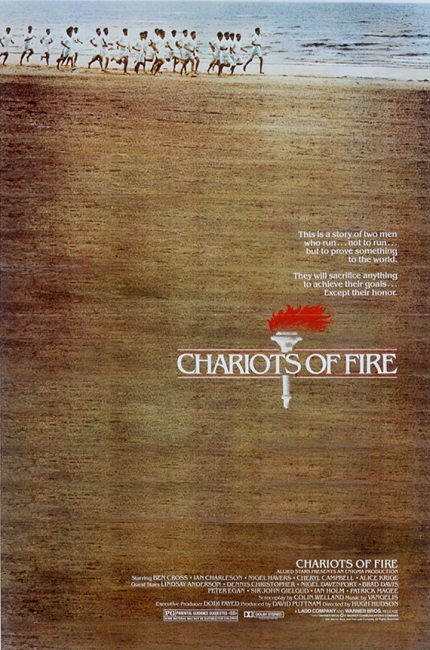
Chariots of Fire – 1981
I will start this review off by saying that I find it ironic that a movie about running fast was so slow! I’m sorry, but seeing runners racing in slow motion does not make it feel like a spiritual experience to me. And there was a LOT of slow motion running. This was a good movie, but only if you have a lot of patience. And I must also make a confession. This is the first Best Picture winning movie I can remember seeing at the theatre. I was 8 years old and my father took my brothers and I to the movies. I was bored out of my gourd.
Fortunately, I have a different perspective as an adult. Let’s face it: This is not a children’s movie. There are a lot of adult concepts that are covered that I wasn’t old enough to understand back then. Unfortunately, though I fought against it, I had difficulty forgetting how bored I was when I first watched this movie in 1981.
As you might have already guessed, Chariots of Fire was about running. More specifically, it is about Olympic Track runners. It is based on true events that took place in the 1920s. Runner Harold Abrahams, played by Ben Cross, is a Jewish Englishman. He has apparently never lost a race in his life. He is also an angry young man who wants to stick it to anyone who is anti-Semitic. Unfortunately, he attends Cambridge College, which is overtly Catholic. The staff treats him unfairly because of his religious beliefs. So rather than running away, he runs on the track team. Exceling on the track is his way of throwing his religion in their faces. While there he meets and falls in love with professional soprano, Sybil Gordon, played by Alice Krige.
Interesting note: Sybil is introduced as she is performing the role of Yum-Yum, the female lead, in the Gilbert & Sullivan Operetta, The Mikado. In real life, Gordon never played that lead role, though she did play the part of Peep-Bo, one of Yum-Yum’s friends.
Runner Eric Liddell, played by Ian Charleson is a China born Scotsman whose parents are missionaries in China. He is a devoutly religious man who believes that because God gave him the ability to run fast, his running is a way to glorify God. His sister Jennie, played by Cheryl Campbell, wanted him to return to China as a missionary. She feared that running in the Olympics might be dangerous for him in some spiritual way.
Interesting note: This was something that was invented for the movie. In real life, Jennie was actually very supportive of Eric’s running.
Both men were supposed to be the fastest men in Brittan. The actors did a good enough job, though it was honestly hard to tell just how fast they were. They were always shown running in slow motion with inspirational, yet somehow creepy and ominous music blotting out every other sound. I understand that the filmmakers were trying to make running seem like the religious experience it apparently was for the two men, but for me it just translated into slow. It seems to me that a race would catch my attention a lot more if I was actually watching men running fast in hearty competition.
I think this might have been a better movie if they had taken out all the slow motion running because the stories that took place off the race track were interesting enough to keep my attention. Of course, there was much more to the movie than running. There was the anti-Semitic sub-plot, the devout Catholic angle, the love story between Harold and Sybil, the hard training to be the best, the preparation for the Olympic games, the disappointment of defeat, and the glory of winning.
This was a period piece and the costumes and sets were all quite appropriate. I have always liked women’s fashions from the 1920s. I always found that fashion designers were trying to be as daring as possible without going too far. Another thing that was good was that the actors looked right for the period. I have seen period specific movies in which the actors had very modern faces. They didn’t look like they belonged in the era in which the story took place. The proper hair style can account for some of this inconsistency, but not all of it. Ben Cross and Ian Charlson looked like they had both stepped right out of 1922.
But thinking in those terms, for me, the music didn’t really work very well. Of course, the score by composer Vangelis was popular enough to win the Academy Award for Best Score. But I thought that, as a whole, it wasn’t that great. True, that opening instrumental theme was a great piece of music. It was beautiful, inspiring, and memorable. But that was the only part of the score that really worked. For that opening scene, showing the men running along the beach, it was great, though it had a very synthesized modern sound that did nothing to put me in the 1920s. But even then it would have been fine if the rest of the film had a score that was in the same style as the opening theme. But the rest of the film had music that was strange and slow, and quite unmemorable.
Other actors in the film who stood out to me were Ian Holm, John Gielgud, and David Yelland. Holm played Sam Mussabini, a trainer who took on Abrahams as his student. I have always liked Holm as an actor, and his role in this film did not disappoint me. He looked the part, acted well, and did a fine job. He also played drunk very well after his student Abrahams won his gold medal for the 100 meter dash. Believably drunk is not easy to play. And there was one thing he said in particular that really made sense to me. He said, “Now that you have won you can put all this behind you and start living.” (Unfortunately this is a paraphrase I should have written the exact quote down.)
And it was such a true statement because they showed how training for the Olympics, training to be the best became the kind of obsession that took over the runner’s life. I’m sure that the athletes of today go through the same experiences. The sport becomes everything. It eclipses everything and becomes the most important thing in the athlete’s life. It has to. It is the only way for someone to be the best.
In Abraham’s case, it forced him to set Sybil aside until the Olympics were over. But he was fortunate. She understood and waited for him to win his gold medal. When he did, he took Mussabini’s advice and returned to her.
John Gielgud played the Master of Trinity at Cambridge University. He was one of the men who was anti-Semitic, treating Abrahams badly because he was a Jew. I can’t picture Gielgud playing anything other than a stuffy British professor, lawyer, or banker. His face just has that permanent “I’m better than you” kind of smugness that is, on rare occasions, broken by a kindly smile.
David Yelland had a very small but memorable part as the Prince of Wales who attended the 1924 Olympics. His part was important to the plot. You see, when Liddell finds out he is scheduled to run in a race on a Sunday, he refuses to run. He believes that Sunday is intended by God to be a day of rest. The Prince requests a private audience with him to try to convince him to run. Even then, Liddell politely refuses, saying that his allegiance to God is greater than his allegiance to his country. Yelland was very handsome and played the small part very well.
Though it wounds him Liddell to do so, he still refuses to run. Fortunately, a solution is found. Another runner who has already won a gold medal in another race allows Liddell to run in his place in the 400 meter, which takes place on a Thursday.
Interesting note: Liddell’s adherence to his religious convictions made headlines all over the world. Before the race began, he was given a note that said “It says in the good book ‘He that honors me, I will honor’. Good Luck.” In reality, this note was given to him by his British teammates. In the film, it was given to him by his opponent, American runner Jackson Scholz, played by Brad Davis. Colin Welland, the movie’s screenwriter asked the real Scholz permission to make this little change for dramatic effect. Scholz’s reply was, “Yes, great, as long as it makes me look good.”
Another interesting note: At the end, the film shows a few paragraphs on the screen, telling what happened to the characters. Abrahams married Sybil and went on to be the elder statesman of British Athletics. Liddell, went on to more missionary service in China, but was killed in 1945 in Japanese-occupied China.
When it comes down to it, the movie was a bit too slow for my tastes. That didn’t make it a bad movie, just a slow one. I have done my best not to let my memories of being bored with it as a child affect my enjoyment of it as an adult. There were plenty of good things about the movie, and even a moment or two of greatness. But on the whole, it was just not my cup of tea.
Still, I can understand why it won best picture. It was a movie about dreams of Olympic glory. The Olympics have always been about international cooperation, being the best one can be, integrity, and following ones dreams. They have been fostering inspirational stories since their inception in 1896, and continue to positively inspire people around the world today.
Just… enough with the slow-motion running.
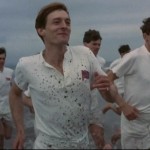
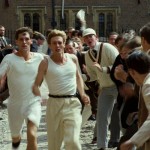
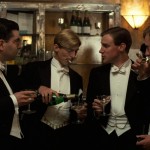
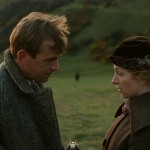

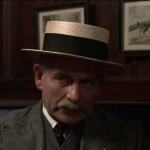
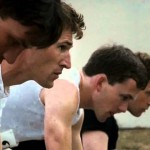
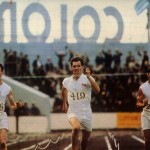
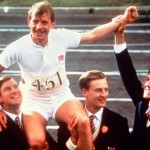
You make some valid points about Chariots of Fire. However:
Don’t you know that the colleges of Cambridge University are Anglican (Church of England?)
Note. Eric Liddell was never Catholic. He was a protestant preacher of the Congregational Union of Scotland.
There is no “Catholic angle”, because the Roman Catholic Church was not involved, and was not part of the lives of the characters.
I appreciate your comments, but I stand by my review. My research says that Anglicanism is a form of Catholicism, and I never specified the Roman Catholic Church. The Church of England is also Catholic. And I never once stated that Lidell was Catholic. I only said that he had strong religious beliefs.